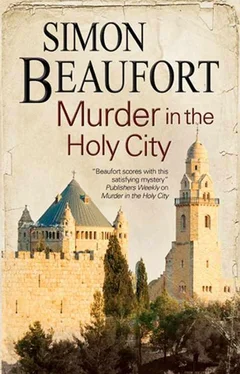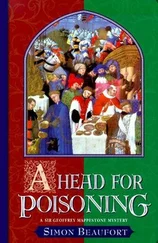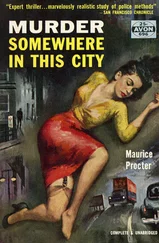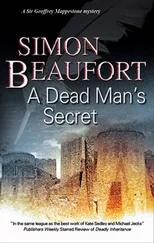Simon Beaufort - Murder in the Holy City
Здесь есть возможность читать онлайн «Simon Beaufort - Murder in the Holy City» весь текст электронной книги совершенно бесплатно (целиком полную версию без сокращений). В некоторых случаях можно слушать аудио, скачать через торрент в формате fb2 и присутствует краткое содержание. Год выпуска: 0101, Жанр: Исторический детектив, на английском языке. Описание произведения, (предисловие) а так же отзывы посетителей доступны на портале библиотеки ЛибКат.
- Название:Murder in the Holy City
- Автор:
- Жанр:
- Год:0101
- ISBN:нет данных
- Рейтинг книги:3 / 5. Голосов: 1
-
Избранное:Добавить в избранное
- Отзывы:
-
Ваша оценка:
- 60
- 1
- 2
- 3
- 4
- 5
Murder in the Holy City: краткое содержание, описание и аннотация
Предлагаем к чтению аннотацию, описание, краткое содержание или предисловие (зависит от того, что написал сам автор книги «Murder in the Holy City»). Если вы не нашли необходимую информацию о книге — напишите в комментариях, мы постараемся отыскать её.
Murder in the Holy City — читать онлайн бесплатно полную книгу (весь текст) целиком
Ниже представлен текст книги, разбитый по страницам. Система сохранения места последней прочитанной страницы, позволяет с удобством читать онлайн бесплатно книгу «Murder in the Holy City», без необходимости каждый раз заново искать на чём Вы остановились. Поставьте закладку, и сможете в любой момент перейти на страницу, на которой закончили чтение.
Интервал:
Закладка:
He gave Roger a weak smile. “We know John lived at the citadel, but according to the notes of the Patriarch’s scribes, Sir Guido had recently moved into the Augustinian Priory near the Holy Sepulchre. He was apparently considering giving up knightly duties to become a monk.”
“Was he heat-struck or something?” asked Roger, clearly nonplussed. “Why would he want to do anything as stupid as that?”
“He would not be the first,” said Geoffrey. “Several knights and soldiers joined the priesthood when they reached Jerusalem. Not everyone came on Crusade for the loot and the fighting.”
Roger looked unconvinced, and Geoffrey wondered what the burly Englishman would think if he became aware of Geoffrey’s own misgivings about his knightly obligations.
They walked in silence. The sun was still fiercely hot, although its intensity had started to fade. Geoffrey felt slightly light-headed, but did not like to admit so to the others. The effects of his near escape were beginning to take their toll, and he wanted nothing more than to lie down in his own chamber and sleep. Helbye asked that he be allowed to stop to buy water from a man carrying two leather buckets suspended from a yoke over his shoulders, but Geoffrey sensed something untoward in the man’s evident enthusiasm for selling it to them, and refused permission. He bought some for the dog, and felt vindicated when the animal declined it after a single sniff.
They were received politely but coldly by the Augustinians at their premises near the Church of the Holy Sepulchre, but at least they were invited to sit for a while in the cool of a marble chamber. While Geoffrey marvelled at the delicate patterns set into the stone, the others sipped appreciatively at the fine red wine they were brought.
“What do you want with us?”
Geoffrey turned at the hostile voice and saw an obese man in the robes of an Augustinian Canon standing in the doorway. The Canon had a bright red face that clashed unappealingly with his greasy ginger hair.
“We are investigating the murder of Sir Guido of Rimini on behalf of the Advocate,” replied Geoffrey, coldly polite. “I would be grateful if you would answer some questions.”
The Canon’s manner softened somewhat. “Ah, yes. Poor Brother Salvatori.” He caught Geoffrey’s puzzled expression and hastened to explain. “Sir Guido was going to take major orders with us. He had already moved his belongings here, and had taken the name Brother Salvatori in readiness. He spent most of his time here, praying and following our daily routines.”
“Did he leave at all? Did he have any visitors?”
“Not that I know of,” said the Canon. “He was serious in his intentions and, once he had moved here, he seldom left.”
“Seldom? That implies he did leave from time to time.”
“Well, perhaps he did once or twice,” said the Canon dismissively. “What does it matter?”
“It might matter a great deal,” said Geoffrey irritably. “It might help us discover who killed him, and so prevent another man from dying. This is important. Think back to the few days before he died. Did he leave then?”
The Canon screwed up his face in thought. “I think I may recall something. Two days before he died, he was out all night. He returned at dawn and … well, he had a man in the room with him.”
Geoffrey waited for elaboration, but none came. “Did you know this man?”
“I did not, and I do not condone such activities.”
“Can you describe him?”
The Canon sighed heavily. “Not really. He was a Benedictine. And he had eyes of different colours. I heard them talking together in low voices.”
“Could you hear what they were saying?”
“No. And I did not wish to. But I heard the scrape of pen on vellum.”
Geoffrey was astounded. The Canon pretended that he had only just recalled the incident, but it seemed to Geoffrey that it was clearly vividly etched in the man’s mind. He must have been very close to them to see that the eyes of the Benedictine were different colours, and if he had been able to hear one of them writing, then he must also have been listening very hard.
“Have you seen this Benedictine since?”
“Yes. He hovered around outside our premises the morning Brother Salvatori was found dead-that was two days after he had been in Salvatori’s room. Then news came of the murder, and he disappeared. I have not seen him since.”
“Why did you not mention all this to the Patriarch’s men?”
The Canon drew himself upright. “Brother Salvatori was a good man. And I feel he was sincere in his intentions. I did not want his name sullied with the incident of which I have told you.”
“But it sounds as though Guido and this monk were only talking and writing,” Geoffrey pointed out. “Not engaged in any kind of activity that would besmirch the reputation of either.”
The Canon eyed him pityingly, and Geoffrey wondered how the Canon could justify such conclusions from the information he had. He had encountered men like the Canon many times before and knew that a conviction, once held, would never be swayed, no matter what evidence was presented to the contrary.
“Tell me what happened the morning Guido’s-Salvatori’s-body was found.”
The Canon raised his hands. “I received a summons to go to the citadel-Salvatori’s body was taken there after it was removed from the Dome of the Rock. The Advocate knew of Salvatori’s intention to join the priesthood, and wanted me to pray over his body.”
“Was there anything with the body when you saw it at the citadel?”
“What do you mean? Salvatori had no purse or jewellery. He had forsaken such things in favour of a spiritual life,” replied the Canon sanctimoniously.
Geoffrey looked from his own strong, tanned hands to those of the Canon who hastily hid them in the sleeves of his habit when he saw the knight’s sceptical gaze. The Canon’s hands were fat, white, and adorned with rings bearing heavy stones. Geoffrey wondered how the Canon could be so outrageously hypocritical in his piety and still expect to be taken seriously. Geoffrey had seen brave men waver before a battle: perhaps monks wavered when confronted with the easy pickings of the Holy Land.
“I meant was the weapon that killed Sir Guido with his body?”
“Oh, that. Yes. It was there. It was a huge thing, like a Saracen weapon, with a jewelled hilt. I inspected it, but the jewels were not real, only coloured glass.”
“What happened to it?”
“It was not worth keeping, so I left it with Salvatori’s body.” The Canon paused. “When I say it was not worth keeping, I mean I …”
“Yes. Thank you. I know what you mean,” said Geoffrey, his dislike for the Canon increasing by the moment. He saw he would get no more useful information from him and, somewhat disgusted, he took his leave with curt thanks.
“There is only one other thing,” called the Canon to his retreating back. Geoffrey stopped and looked back. “Brother Salvatori was sent a letter that arrived the day he died. We did not break the seal and read it, of course-that would have been most improper. I took it to the citadel myself, because the seal was that of the Advocate.”
Wearily, Geoffrey and the others trudged up the Via Dolorosa toward the Church of the Holy Sepulchre, that most holy of Christian places, said to be the site of Jesus’ tomb. The Via Dolorosa was the route taken by Jesus at his crucifixion and was a narrow street where the earth underfoot was baked hard and dry. Unlike the rest of the city, this sacred area was full of people, for it was to this road, with the Holy Sepulchre at its end, that pilgrims came to walk barefoot to beg forgiveness for all manner of sins, some petty, most not. Here and there, voices were raised in desperate supplication in a variety of languages-Latin, Greek, French, Italian, and many Geoffrey did not recognise.
Читать дальшеИнтервал:
Закладка:
Похожие книги на «Murder in the Holy City»
Представляем Вашему вниманию похожие книги на «Murder in the Holy City» списком для выбора. Мы отобрали схожую по названию и смыслу литературу в надежде предоставить читателям больше вариантов отыскать новые, интересные, ещё непрочитанные произведения.
Обсуждение, отзывы о книге «Murder in the Holy City» и просто собственные мнения читателей. Оставьте ваши комментарии, напишите, что Вы думаете о произведении, его смысле или главных героях. Укажите что конкретно понравилось, а что нет, и почему Вы так считаете.












